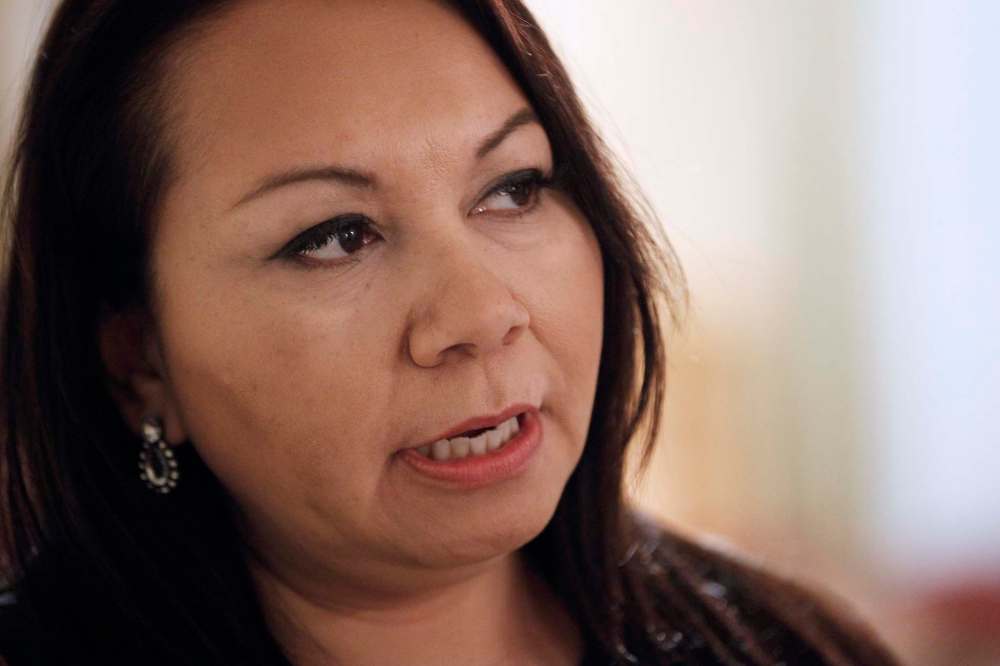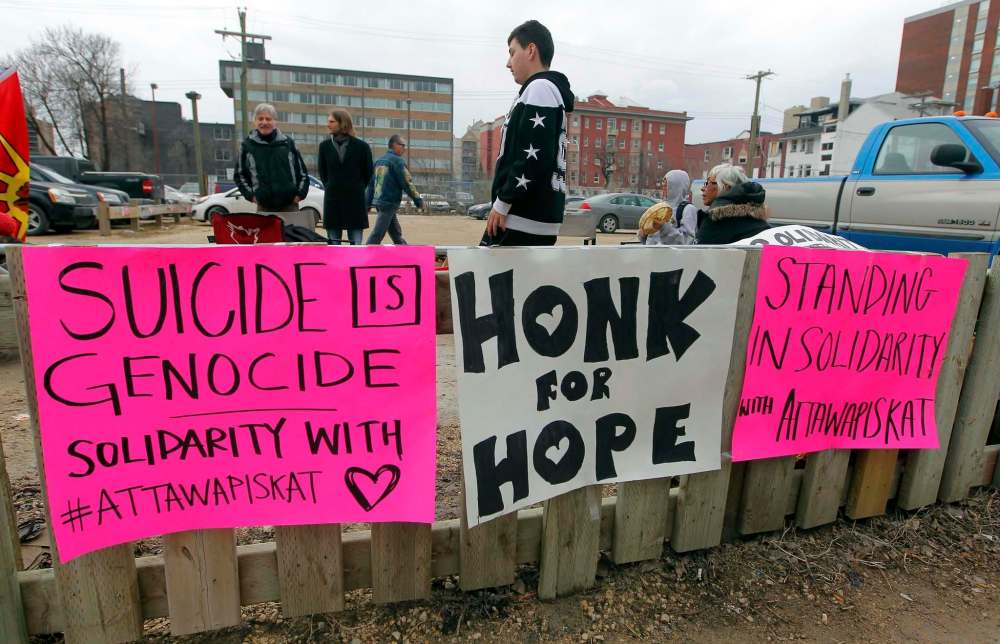Crisis team to the rescue
Mobile groups a response to First Nations suicide crisis
Advertisement
Read this article for free:
or
Already have an account? Log in here »
To continue reading, please subscribe:
Monthly Digital Subscription
$1 per week for 24 weeks*
- Enjoy unlimited reading on winnipegfreepress.com
- Read the E-Edition, our digital replica newspaper
- Access News Break, our award-winning app
- Play interactive puzzles
*Billed as $4.00 plus GST every four weeks. After 24 weeks, price increases to the regular rate of $19.00 plus GST every four weeks. Offer available to new and qualified returning subscribers only. Cancel any time.
Monthly Digital Subscription
$4.75/week*
- Enjoy unlimited reading on winnipegfreepress.com
- Read the E-Edition, our digital replica newspaper
- Access News Break, our award-winning app
- Play interactive puzzles
*Billed as $19 plus GST every four weeks. Cancel any time.
To continue reading, please subscribe:
Add Winnipeg Free Press access to your Brandon Sun subscription for only
$1 for the first 4 weeks*
*$1 will be added to your next bill. After your 4 weeks access is complete your rate will increase by $0.00 a X percent off the regular rate.
Read unlimited articles for free today:
or
Already have an account? Log in here »
Hey there, time traveller!
This article was published 30/03/2017 (3081 days ago), so information in it may no longer be current.
Manitoba First Nations have rolled out the first provincewide indigenous mobile crisis team in response to last year’s wave of youth suicide crises in the north.
“We are pleased to announce that a mobile mental health crisis response team is now in place to support both northern and southern First Nations,” northern grand chief Sheila North Wilson said Thursday during a two-day mental health conference hosted by Manitoba Keewatinowi Okimakanak (MKO).
The seven-member team, drawn from the ranks of veteran mental health workers in Manitoba’s indigenous communities, was introduced at the conference. The initiative is part of a three-year, $10-million program in which six more teams are being created to set up mental-health prevention programs for the province’s 63 First Nations. The money was announced in the Trudeau government’s first budget in 2016.

“Each of the teams will have a unique First Nations-led focus,” North Wilson said. “We look forward to building on this interim measure to ensure that long-term sustainable mental wellness supports are in place for all First Nations in Manitoba.”
The team’s first assignment occurred hours before the formal announcement. Three team members were headed to Norway House Cree Nation after a gang-related shooting in the northern community Tuesday in which a child was almost hit.
Meanwhile, work continues in Winnipeg to set up a crisis hotline; MKO will co-ordinate calls and deploy the team in response to First Nations calls for help.
Norway House couldn’t wait after a bullet endangered a child’s life this week. No one was injured but everyone in the community 460 kilometres north of Winnipeg was shaken up: “They shot into a home and they just missed a little girl,” Norway House Chief Ron Evans said by phone.
“The mobile crisis team, their mandate is to work with people dealing with traumatic incidents,” he said. “If this little girl had been hit, it would have been national news.”
Norway House is waiting for the province to agree to set up a checkstop on the only road into the isolated First Nation.
“Our people are not feeling safe. We want a checkstop 24/7, 365 days a year, but to proceed we need the blessing of the provincial government. We need a letter to allow us to set up a checkstop on Hwy 373,” Evans said.
Until then, there’s no way to stop the trafficking of drugs and alcohol or keep gang members out, the chief said.
The issue reflects the range of crises beyond suicide that the mobile team is set up to handle.
Canada’s 1.4 million indigenous people make up four per cent of the general population and have higher levels of poverty and a lower life expectancy than non-indigenous Canadians. They are more likely to be victims of violent crime, addiction and incarceration — factors related to a lack of opportunity that fuels rotating cycles of youth suicide.
Last winter, Pimicikamak Cree Nation in Cross Lake declared a state of emergency to cope with a suicide crisis, followed by Shamattawa and then Ontario’s Attawapiskat First Nation.

The crises made national headlines and sparked weeks of protests and occupations of federal Indigenous Affairs offices in cities across Canada. The one in Winnipeg lasted weeks longer than in other cities.
“This is about the ongoing issues around suicide that our communities have been facing for a long time,” North Wilson said. “And of course it was heightened by what happened in Pimicikamak.
“I hope the teams go in to provide another hand to deal with the trauma and crises our young people feel when they’re subjected to poverty and lack of resources. Sometimes kids may not be able to explain what they feel but what they feel is the trauma of colonization,” North Wilson said.
Suicide rates are five times higher among indigenous males aged 15 to 24 and seven times higher for girls in the same age category compared with non-indigenous youth in the rest of Canada.
“We come to a realization that there are few opportunities and sometimes it’s hard for a person to bear and they just give up,” she said. “That’s what kills us in the end.”
She said opening economic doors for indigenous youth will take a massive effort on the part of indigenous and non-indigenous Canadians.
alexandra.paul@freepress.mb.ca
History
Updated on Thursday, March 30, 2017 6:08 PM CDT: fixes typo in headline
Updated on Thursday, March 30, 2017 10:30 PM CDT: fixes typos found by writer
Updated on Friday, March 31, 2017 7:46 AM CDT: Edited

